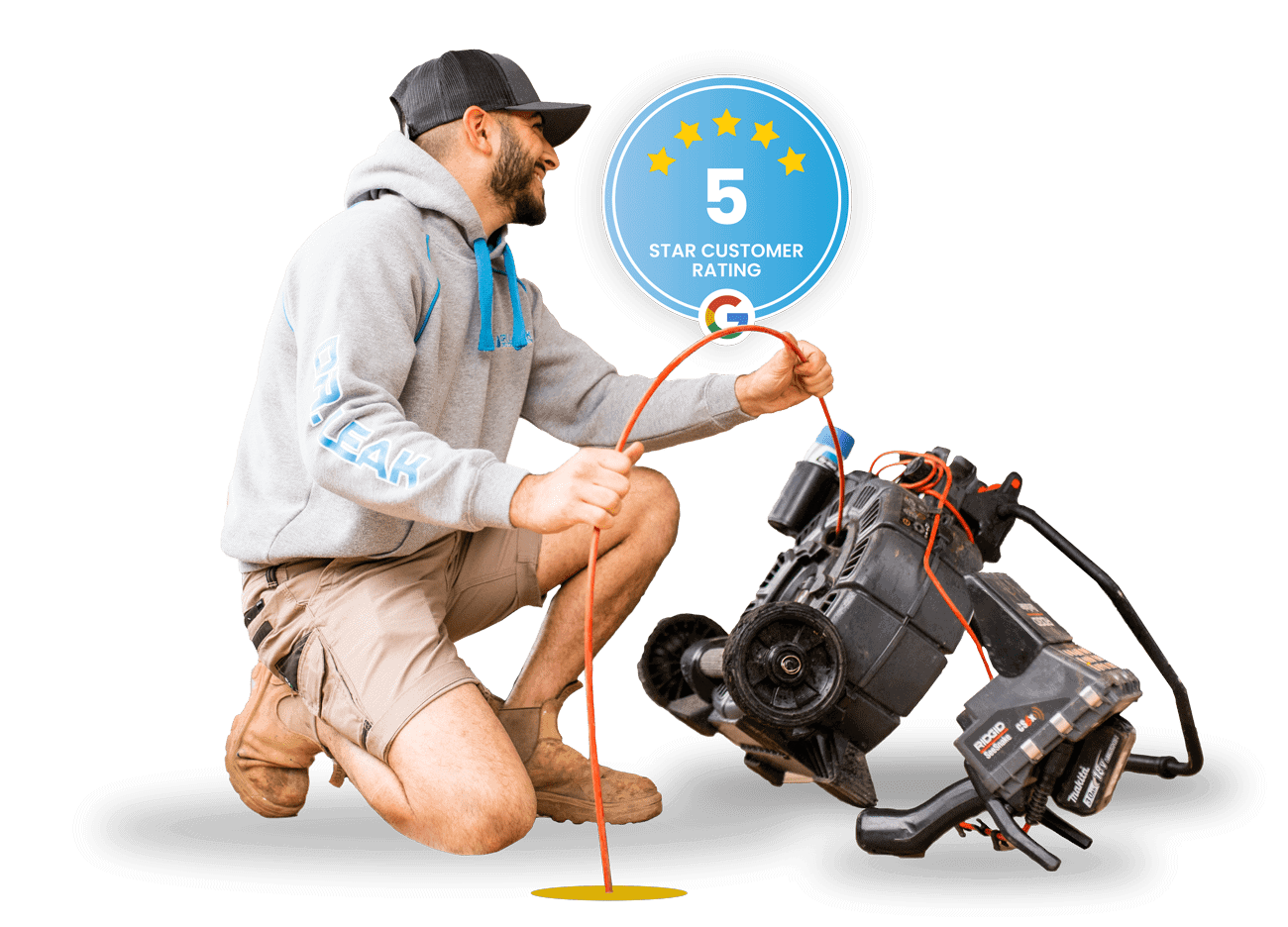1300 375 325
Call us on: 1300 375 325
24/7 emergency service
Click here for
a free quote
a free quote









Millions of people flock to this beautiful eastern capital year after year, visiting Sydney for the quaint neighbourhoods that are positioned alongside some of the country’s greatest attractions. Sydney, NSW is home to some of the state’s most beautiful suburbs and with over 15 years of experience, Dr Leak Plumbing is determined to keep the homes in these areas free of leaks and other plumbing issues.
Dr Leak offers a blocked drain clearing service in Sydney that is second to none. Whether you have a blocked sewer drain in the Eastern Suburbs or you require drain-clearing specialists in the Northern Beaches, we’ve got you covered. Dr Leak proudly provides expert plumbing services, including a 24/7 emergency call-out service for blocked pipes and drains, all over Sydney from the Sutherland Shire to the North Shore.

Learning how to clear a blocked drain may not always require the aid of a plumber, but if left too late the blockage may become more severe. There are many reasons why a drain can be blocked and awareness is key to understanding how to keep the drains in your home blockage-free.
Nature is a hard beast to tame and tree roots can often be the cause of blockages in your external drain pipes. The smallest gap or crack in your pipes can be infiltrated by the roots of trees in your yard which can lead to not only blockages but leaking too.
Drain blockages are often caused by a build-up of materials in the pipes that eventually become an obstruction. Certain materials being put down the drain can contribute to a blockage over time including grease, oils, soaps and other viscous liquids.
In the everyday use of your drains, some things can accidentally get flushed, like jewellery or small objects that can cause a blockage, but there are also things that can cause the slow build-up that will lead to a blockage. Human and pet hair, baby wipes, dental floss and personal hygiene products are some of the main causes of blocked drains in Australian bathrooms.
Whether your drains have been newly installed or you are experiencing problems later on, the cause could be due to improper installation. Mistakes can happen, and whether the problems come on quickly or slowly, these mistakes can lead to the need for a qualified blocked drain plumber in Sydney.
It is important to attend to your blocked drains quickly to avoid any further damage to your home, and with our 6-month interest-free payment plans, you can attend to emergency blocked drains right away without the stress of having to pay on the spot.

There are several signs that can indicate that you have a blocked sewage pipe or drain in your home. Often, blocked drains are caused by a slow build-up over time so the earlier you notice the signs, the easier the issue will likely be to fix.
Whether it’s a slow-draining toilet, blocked storm water drains or a backed-up kitchen sink that you are dealing with, it is always best to call for a blocked drain plumber in Sydney that knows how to handle the situation and can have your home blockage free in no time.
The signs that you might be dealing with a blocked drain in your home can include:
Whether it’s your toilet that doesn’t always flush perfectly or slow-draining water from your sink, you will notice that the water in your home is draining more slowly than normal. This can indicate that there is a blockage somewhere in your pipes that is preventing the natural drainage flow of water.
If you have blocked drains in your kitchen or bathroom, you might notice that your sink will start to make gurgling sounds when the water is draining away. These noises are caused by the water trying to get past an obstruction in your drain that could lead to a blockage.
As your drainage problem worsens, you will notice that slow-draining water can result in your toilet or sink backing up. This is the next stage in the blocked drain process which means that your blockage is getting worse and should be attended to ASAP.
If you are dealing with a blocked sewage pipe or a blocked stormwater drain, you may notice that water or other types of liquid may begin pooling in areas of your yard. This is a sign that you will need the services of drainage specialists/experts to ascertain where the water is coming from and attend to the issue as quickly as possible.
As drain-clearing specialists, we have access to a range of tools that we use to ensure that your pipes are clear and blockage free. These include:
With our specialist tools, our team can attend to your drainage issues in no time at all, keeping your plumbing system safe and free from any further damage. Drain-clearing work is a step-by-step process that takes experience and precision to perfect.
The process of clearing your drains begins with some investigative work to ascertain where the blockage is located and the cause of it. From there, we can decide on a course of action to clear the blockage.
With the use of our specialist equipment, we will clear the blockage from your drain to free up the water flow.
Once the obstruction is cleared we will use our CCTV cameras to check the condition of your pipes, making sure that the blockage has not caused any further damage.
If damage has been caused by the blockage in your pipes, we can perform a pipe relining treatment to restore the integrity of your pipe walls, keeping them in optimum working order for years to come.
Dr Leak is the blocked drain plumber in Sydney that you should call for peace of mind. With $0 call-out fees, pensioner and senior citizen discounts and same-day service if you contact us before 2pm, there is no better choice for handling blockages in your home. Blocked drains, toilet repairs, gas fitting and shower repairs are all part of our expert plumbing repertoire which are all complemented by the $50 discount that you can receive for online bookings. Contact us today to attend to any blocked drains or plumbing issues in your Sydney home.















Sydney Plumbing Services
• Blocked Drains Sydney
• Pipe Relining Sydney
• Leak Detection Sydney
• Gas Fitting Sydney
• Stormwater Drain Cleaning Sydney
• Hot Water Systems Sydney
• Emergency Plumbing Sydney
• Shower Repairs Sydney
• Toilet Repairs Sydney
• Leaking Tap Repairs Sydney
• Leaking Pipe Repairs Sydney
• Burst Pipe Repairs Sydney
• Roof & Gutter Leak Repairs Sydney
• Drain Camera Inspections Sydney
• Gas Cooktop Installation Sydney
• Handyman Maintenance Sydney
__________________________
Melbourne Plumbing Services
• Blocked Drains Melbourne
• Pipe Relining Melbourne
• Leak Detection Melbourne
• Gas Fitting Melbourne
• Stormwater Drain Cleaning Melbourne
• Hot Water Systems Melbourne
• Emergency Plumbing Melbourne
• Shower Repairs Melbourne
• Toilet Repairs Melbourne
• Leaking Tap Repairs Melbourne
• Leaking Pipe Repairs Melbourne
• Burst Pipe Repairs Melbourne
• Roof Leak Repairs Melbourne
• Drain Camera Inspections Melbourne
• Gas Cooktop Installation Melbourne
• Handyman Maintenance Melbourne
__________________________
Plumber Sydney
• Canterbury-Bankstown
• Eastern Suburbs
• Greater Western Sydney
• Hills District
• Inner West Sydney
• Macarthur
• Northern Beaches
• North Shore
• South East Sydney
• South West Sydney
• St George Area
• Sutherland Shire
• Sydney CBD
__________________________
License No. 368473C
ABN: 72 648 410 333
ACN: 648 410 333
Plumber Melbourne
• Melbourne CBD
• Northern Suburbs
• Eastern Suburbs
• Western Suburbs
• South-Eastern Suburbs
• Bayside Suburbs
• Mornington Peninsula
__________________________
About Us
• Testimonials
• Privacy Policy
• Terms & Conditions
• Meet the Team
Services
Regions
Blogs
Sydney Suburbs
Melbourne Suburbs
Sitemap
Copyright© 2023. Dr Leak Plumbing Services. All Rights Reserved.